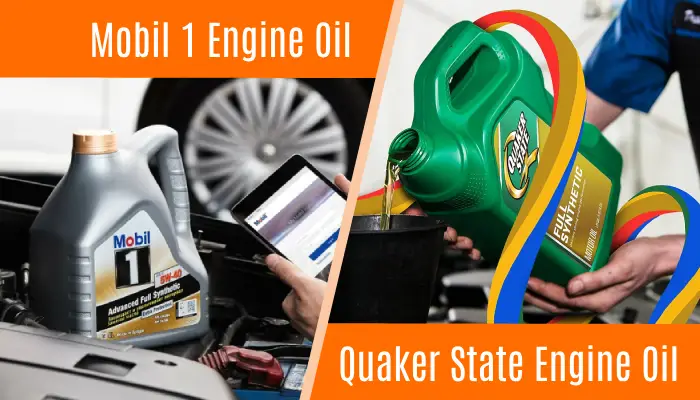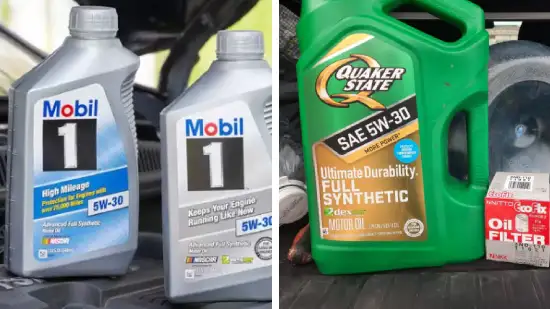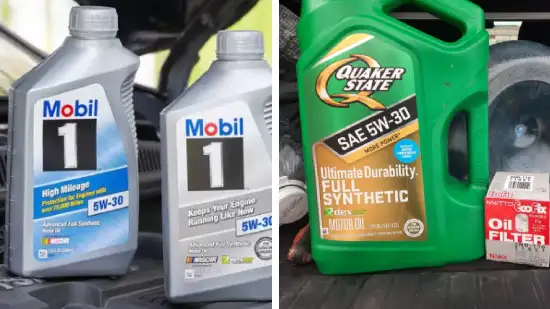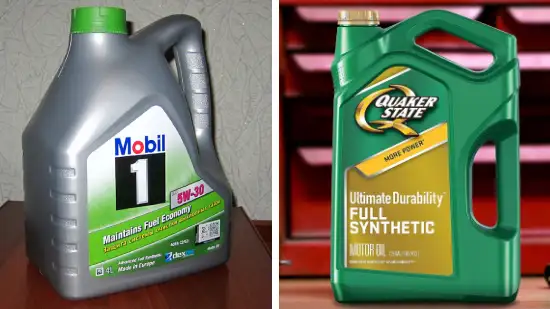Physical Address
304 North Cardinal St.
Dorchester Center, MA 02124
Physical Address
304 North Cardinal St.
Dorchester Center, MA 02124

Mobil and Quaker State are two well-known engine oil brands for modern vehicles. Both brands offer a range of oils designed to keep your engine running smoothly, but they have some notable differences.
Mobil 1, for instance, is celebrated for its high purity and consistency, making it a top-tier, fully synthetic motor oil. It’s engineered to provide outstanding performance and protection across a wide spectrum of vehicles.
On the other hand, Quaker State takes a multifaceted approach by offering various oil options, including both conventional and synthetic blend varieties.
We’ll explore the distinctions between Mobil 1 and Quaker State engine oils, helping you make an informed choice that suits your vehicle’s needs and your driving preferences.
No products found.

Below are 9 significant differences to consider when distinguishing between Mobil 1 and Quaker State engine oils for your vehicle.
Now, check out the significant differences in detail that set Mobil 1 and Quaker State apart for choosing the right engine oil for your vehicle.
Mobil 1 is a fully synthetic motor oil, which means it’s made entirely from chemical compounds. It undergoes a rigorous refining process to remove impurities, producing a highly pure and consistent oil. This purity allows Mobil 1 to provide exceptional performance and protection for different types of vehicles.
In contrast, Quaker State offers a range of oils, including conventional and synthetic blend options. Conventional oil is derived from crude oil and contains additives to improve its performance.
Synthetic blend oil, as the name suggests, combines synthetic and conventional oil, offering a balance between performance and cost.
To better understand how Mobil 1 and Quaker State engine oil differ in terms of compatibility with different engines, let’s look at the differences between them.
Mobil 1 offers a wide range of products tailored for specific engine types and needs. For instance, they’ve options for high-mileage vehicles, trucks, SUVs, and hybrids.
This means that Mobil 1 engine oil is designed to meet the unique requirements and demands of these different engines, ensuring optimal performance and protection.
On the other hand, Quaker State also provides engine oil options for different engine types, such as turbocharged engines and sophisticated engines. This shows that Quaker State also recognizes the importance of compatibility and tailors their products to meet the specific needs of various engines.
Mobil 1 offers various viscosity grades to cater to diverse engine requirements. Their range includes options such as 0W-20, 5W-20, 5W-30, 5W-40, and 10W-30.
Meanwhile, Quaker State also provides various viscosity grades, but the specific grades and range may vary. Some of the options offered by Quaker State include 5W-30, 0W-20, and 10W-30.
It’s important to note that the choice of viscosity grade is crucial as it determines the oil’s flow characteristics and its ability to lubricate and protect the engine components effectively.
Therefore, it’s essential to select the viscosity grade that aligns with your engine’s requirements and the manufacturer’s recommendations.
Considering their respective oil drainage intervals will help you understand the differences between Mobil 1 and Quaker State engine oil.
Mobil 1 is known for its extended oil change intervals, recommended for oil change intervals of 8,000 to 10,000 miles. This longer interval is made possible by the superior quality and advanced synthetic formulation of Mobil 1 oil.
The oil is designed to maintain its chemical and physical properties for a longer period, providing excellent lubrication and protection to the engine components.
In contrast, Quaker State recommends oil change intervals that align with OEM guidelines, typically every 3,000 to 4,000 miles. This regular and consistent maintenance schedule ensures that the engine is constantly supplied with fresh, clean oil, minimizing the risk of engine wear and tear.
Regarding additives, Mobil 1 and Quaker State engine oil are different in their formulation and performance.
Mobil 1 incorporates a Triple Action Formula with advanced performance additives to enhance engine protection, cleanliness, and overall performance. This includes anti-wear additives that reduce friction and wear on engine components, extending engine life.
Additionally, detergents and dispersants work to prevent the formation of deposits and sludge, ensuring engine cleanliness. Mobil 1 also utilizes friction modifiers to reduce friction in the engine, potentially improving fuel economy and efficiency.
In contrast, Quaker State includes anti-wear additives for durable wear protection, anti-sludge additives to maintain engine cleanliness, seal conditioners to prevent leaks, and viscosity improvers to maintain specified viscosity grades.
Both oils meet various specifications and approvals, but Mobil 1’s additive package appears to be more advanced, making it a preferable choice for demanding conditions and high-performance vehicles.

Mobil 1, known for its exceptional engine protection and performance, is especially effective in high-performance and luxury vehicles. Its advanced full synthetic formulation reduces friction, which can lead to improved horsepower and fuel efficiency. Mobil 1 provides excellent protection against engine wear, even in demanding conditions.
On the other hand, Quaker State also offers solid performance and protection. However, some users argue that Mobil 1’s fully synthetic formulation is more advanced and effective, particularly in challenging situations.
The difference in performance and protection between Mobil 1 and Quaker State lies in the advanced technology and formulation employed by Mobil 1, making it a preferred choice for those seeking superior engine protection and performance.
To understand the distinction between Mobil 1 and Quaker State engine oil, examining their respective ILSAC and API ratings is important.
Mobil 1 synthetic oils comply with the latest industry standards, specifically ILSAC GF-6, which is the most recent specification for passenger car engine oils.
This means that Mobil 1 oils offer improved fuel economy and enhanced engine performance. Additionally, Mobil 1 meets the API SP requirements, which ensure that the oil provides optimum protection for modern engines.
Conversely, Quaker State Full Synthetic motor oil meets the ILSAC GF-5 and API SN standards.
While these ratings still guarantee engine protection, reduced friction, and improved fuel economy, they’re slightly older specifications compared to the ones met by Mobil 1. Therefore, Mobil 1 may offer more advanced technology and benefits.
Continuing the comparison between Mobil 1 and Quaker State engine oil, let’s investigate their high-temperature performance by examining their respective flash points.
Mobil 1, known for its high-temperature stability, typically has a flash point range of 400°F to 450°F (204°C to 232°C). The upper end of this range, around 450°F (232°C), indicates Mobil 1’s ability to withstand extreme temperatures without significant degradation.
On the other hand, Quaker State Full Synthetic motor oils generally exhibit a flash point range of 400°F to 430°F (204°C to 221°C). While slightly lower than Mobil 1, this range still reflects Quaker State’s capacity to maintain stability and performance under high-temperature conditions.
Mobil 1 is a premium brand of fully synthetic motor oil, which means it typically falls within the higher price range for synthetic oils.
The prices for Mobil 1 can vary, but on average, you can expect to pay anywhere from approximately $7.97 to $9.87 per quart. The specific product, viscosity grade, and retailer can also affect the price.
Conversely, Quaker State offers more budget-friendly options in the motor oil market. The cost of Quaker State oil varies based on the type of oil and the specific product within the brand.
For instance, Quaker State Full Synthetic motor oil typically ranges from around $7.39 per quart, making it a more cost-effective choice compared to Mobil 1.
| Aspect | Mobil 1 | Quaker State |
| Oil Type | Full synthetic | Full synthetic, conventional, synthetic blend |
| Engine Compatibility | Various options for different needs | Options for different engine types including turbocharged engines |
| Viscosity Grades | Wide range, including 0W-20, 5W-20, 5W-30, 5W-40, 10W-30 | Various viscosity grades available |
| Oil Drainage Interval (Miles) | 8,000 to 10,000 miles | 3,000 to 4,000 miles (OEM recommendations) |
| Performance Additives | Triple Action Formula with advanced additives | Contains anti-wear additives, anti-sludge additives, seal conditioners, and viscosity improvers |
| Performance and Protection | Renowned for exceptional engine protection and performance, especially in high-performance vehicles | Offers solid performance and protection, may be slightly less advanced |
| ILSAC and API Ratings | ILSAC GF-6, API SP | ILSAC GF-5, API SN |
| Flash Point for High-Temperature Performance | High flash point for excellent high-temperature performance, typically 400°F to 450°F (204°C to 232°C) | Good high-temperature performance with a flash point typically ranging from 400°F to 430°F (204°C to 221°C) |
| Price (per Quart) | Approximately $7.97 to $9.87 | Typically more affordable, starting at around $7.39 |
You can confidently rely on Mobil 1 and Quaker State engine oils as they fully comply with Dexos requirements. Both brands have undergone rigorous testing and have met the specific performance and quality standards set by General Motors (GM).
Dexos certification ensures that these engine oils provide optimal protection and performance for GM vehicles while also maintaining warranty coverage.
For example, Mobil 1™ ESP Formula 0W-40 is the first dexos2™-approved motor oil designed specifically for Chevrolet Corvettes. Quaker State Ultimate Protection 5W-30, on the other hand, meets the performance needs of GM vehicles, including dexos1 Gen 3 requirements.

To determine the best Mobil 1 or Quaker State oil for your vehicle, consult your owner’s manual for the recommended viscosity grade and engine oil specification that align with your car’s specific needs.
Your owner’s manual provides valuable information about the ideal oil to maintain optimal engine performance and longevity. It will specify the recommended viscosity grade, such as 5W-30 or 10W-40, which indicates the oil’s flow characteristics at different temperatures.
Additionally, the manual will mention the engine oil specification, such as API SN or ACEA A3/B4, which defines the oil’s performance and compatibility with your vehicle’s engine.
When choosing between Mobil 1 and Quaker State engine oils, it’s important to consider your vehicle’s specific needs and compatibility with Dexos requirements.
If you seek top-tier, fully synthetic oil with advanced technology and don’t mind investing a bit more, Mobil 1 excels in engine protection, performance, and extended oil change intervals.
In contrast, Quaker State offers a more budget-friendly choice with a range of oil options that still provide reliable performance.
Ultimately, your owner’s manual is your best guide for selecting the right viscosity grade and engine oil specification to ensure your vehicle runs smoothly and efficiently. Make the choice that suits both your car and your wallet.
Last update on 2026-02-19 / Affiliate links / Images from Amazon Product Advertising API